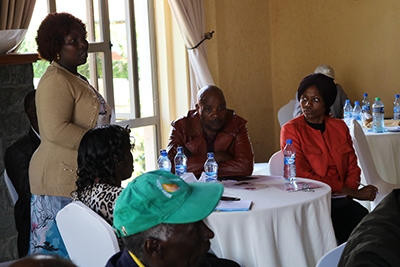
Meru Dairy Union in the Mt. Kenya Region of Kenya represents 55 member cooperatives, making it the largest milk producer and marketer in the area. It’s also well-known because women are central to its operations. They hold half of the board seats, and seven of the 11 management and key staff positions. Women also make up nearly 40 percent of the employees.
These are impressive statistics to highlight during March—the global community celebrated International Women’s Day on Sunday, and Americans are highlighting the historical contributions of women all month long. But Meru Dairy Union wasn’t always the model of gender equity it is now.
In 2015, Edith Nkatha was frustrated. She was sick and tired of caring for the dairy cows her husband owned and delivering the morning and evening milk to their cooperative’s collection center by herself. After all, the money was recorded in her husband’s name. Edith had no voice in how that income was spent, and no voice in the cooperative or the union.
What started at this milk collection center among a group of women sharing their frustrations turned into a boycott. Word spread quietly among the women at other collection centers. They stopped taking such good care of the cows, and a drop in milk supply soon followed. Meru Dairy Union learned about the boycott and took it seriously. After listening to the women and learning firsthand how integral they were to the success of both the cooperatives and the union, they held a dedicated assembly meeting to address the matter.
Meru Dairy Union decided to begin working to increase the number of board positions held by women, creating a clear pathway for women to run for the board and get elected. Today, women hold 50 percent of the board seats. The union also encouraged their member cooperatives to allow women to become members and hold leadership positions. Representatives attended member co-op annual meetings and provided training and education on the importance of including women in decision-making. All 55 member co-ops now allow women to join as members, and some have even elected women board chairs and managers.
Edith and her husband are now both full members of their co-op. Income from the morning milk delivery is recorded under her husband’s membership account, and the evening delivery is recorder under Edith’s account. In addition to paying her children’s school fees, Edith also started a savings account with a local savings and credit cooperative (SACCO). Eventually, she saved enough money to purchase a family car and took out a loan from Capital SACCO to finance other business ventures. Her husband was so impressed with her financial management skills that she now manages all their dairy co-op income.
But Edith didn’t stop there. She now serves as secretary of Meru Dairy Union and board chair of her primary cooperative. And her husband was appointed local Area Chief by the national government. The couple exemplifies how partners can work better together as a team to improve their household’s livelihood.
Edith and her husband exemplify how partners can work better together as a team to improve their household’s livelihood.
Meru Dairy Union partners with NCBA CLUSA on its Creating an Environment for Cooperative Expansion project, supported by the U.S. Agency for International Development (USAID)’s Cooperative Development Program (CDP), a government appropriation that NCBA CLUSA is actively working to preserve. Our previous CDP project in the country also worked with Meru Dairy Union, providing the co-op training in governance and leadership, and empowering women like Edith to speak up.
The CECE project operates in Kenya, Tanzania, Madagascar, Peru and Guatemala. In Kenya, the CECE project is gearing up to provide coaching services to ten cooperatives, include Meru Dairy Union. Improving gender integration in cooperative management and leadership is a key component, and project staff are working with Edith to brainstorm women’s empowerment training and event ideas.


